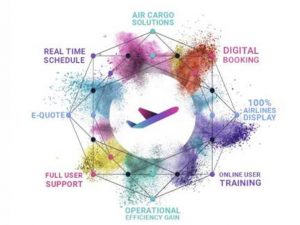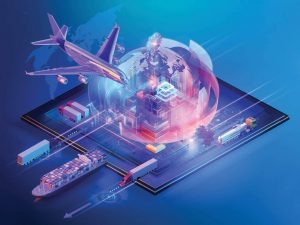Shadowfax has unveiled SF Shield, a technology solution designed to revolutionize logistics security and operational efficiency. SF Shield serves as a multi-layered security framework that combines two major innovations – Track & Trace Solution and SF Eye to enhance visibility, security, and control across logistics operations. It integrates stream-based geospatial algorithms and neural network-based AI for video and image processing, enabling real-time detection of anomalous patterns. SF Shield provides a robust tracking mechanism that minimizes discrepancies and enhances operational transparency. “With the rapid growth of digital commerce, ensuring secure and seamless deliveries has become more critical than ever. SF Shield leverages AI-driven surveillance and real-time tracking to enhance transparency and minimize risks in logistics. By integrating these advanced technologies, Shadowfax is strengthening supply chain reliability and improving the overall delivery experience for businesses and users,” Nitesh Lohiya, Chief Product Officer, Shadowfax.
Read More »CargoAi, Riege team up to optimise air cargo bookings
Riege Software has launched its integration with CargoAi’s innovative Quote & Book API. This collaboration empowers Scope users to instantly search for rates and book air cargo shipments with over 117 airlines directly within the TMS, significantly streamlining operations for users. This partnership equips freight forwarders with a competitive edge, offering instant rate times, improved operational efficiency, and better service to their users. This strategic integration represents a significant step forward in the digital transformation of airfreight, combining Riege’s robust TMS with CargoAi’s cutting-edge digital solutions. “Riege’s Scope is one of the most trusted TMS platforms in the industry, and we are excited to collaborate with them. Our Quote & Book API integration brings unmatched global airline access directly to Scope users, making their workflows smoother and more efficient,” Matt Petot, CEO, CargoAi, said.
Read More »‘Focus will be on scaling networks, payload capacities, cost efficiencies’
Ankit Kumar, CEO, Skye Air said, “2024 has been transformative for India’s drone industry, showcasing Bharat’s immense potential as a land of opportunities. With remarkable advancements in policy, innovation, and sector-wide adoption, the industry has grown exponentially, impacting logistics, agriculture, healthcare, and infrastructure. In a groundbreaking development, Gurugram became the first metropolitan in the world to adopt drone-based delivery in daily life, enabling residents to receive anything and everything within minutes. Milestones like drone-based mail delivery in Arunachal Pradesh, Himachal Pradesh, and AIIMS medical supply chains further highlight the sector’s ability to enhance accessibility and efficiency. As we move into 2025, the momentum will only grow stronger, with drones becoming increasingly integrated into mainstream operations. The focus on scaling networks, boosting payload capacities, and driving cost efficiencies will unlock new opportunities in quick-commerce, urban air mobility, and sustainability. Initiatives like the PM GatiShakti National Master Plan and continued investments in R&D and skill development will further solidify India’s ambition to become a global drone hub by 2030. The future holds incredible promise as drones address real-world challenges, from reducing urban congestion to minimizing carbon footprints, propelling Bharat toward a technology-driven, sustainable tomorrow.”
Read More »RapidShyp partners with Delhivery for reverse logistics
RapidShyp has announced a pact with Delhivery. Through this collaboration, RapidShyp will now offer Delhivery’s express services across 18,700 pin codes, enhancing its last-mile delivery services, Ravi Goel, Chief Business Officer, RapidShyp, said. The partnership incorporates advanced reverse logistics, providing e-commerce sellers with an efficient, end-to-end logistics solution. The pact is enhanced by the addition of reverse logistics, enabling RapidShyp to provide a full suite of delivery solutions for outgoing and return shipments. This ensures businesses can easily handle returns, minimising disruptions to operations. “By partnering with Delhivery, we are reinforcing our commitment to making last-mile delivery more accessible and seamless for e-commerce sellers across India.”
Read More »‘Cargo drones will reduce cost & congestion, improve delivery times’
Ankit Kumar, Founder & CEO, Skye Air, says, “The potential for drones in India’s logistics sector is vast and transformative. These cutting-edge technologies address longstanding challenges such as traffic congestion, limited connectivity in remote areas, and the high costs associated with last-mile deliveries. We have witnessed how drones revolutionize supply chains by significantly reducing delivery times and offering a cost-effective, highly efficient alternative to traditional logistics models. As industries like e-commerce, healthcare, and agriculture continue to expand, drones are set to become a cornerstone of the logistics ecosystem. The growing demand for quick commerce and faster deliveries, especially in urban areas, further underscores the critical role drones can play in reshaping the future of logistics.”
Read More »FedEx unveils ‘One-Stop Shop’ solution to boost cargo ops
FedEx has introduced the ‘FedEx One Stop Shop’, a digital platform that provides access to both shipping and freight forwarding services, simplifying global shipping for businesses. The solution brings order management, booking, and track & trace into a single system, providing businesses with comprehensive visibility and control over shipments. The platform enables streamlined operations through a single point of contact at FedEx, eliminating the complexities of managing multiple freight forwarders. Additionally, it allows businesses to maintain a repository of their past shipments, ensuring a more efficient and transparent logistics process. “FedEx One Stop Shop is a significant step in our transformation into a digitally driven business, powered by our extensive transportation network. Developed in India, it is already creating efficiencies for customers who participated in the pilot by enabling them to book and manage shipments across FedEx shipping and logistics services. We’re excited to scale this platform to other regions, helping businesses simplify and improve their logistics operations,” Nitin Navneet Tatiwala, Vice President of Marketing and Air Network, FedEx, Middle East India Subcontinent and Africa (MEISA) said.
Read More »Blue Dart launches ‘BDAP’ to drive innovation in logistics
Blue Dart has announced the launch of its latest innovation Blue Dart Affiliate Programme (BDAP) for its technology partners and ecosystem enablers. This innovative program is designed to foster collaboration with top technological enablers in the industry, offering seamless integration of Blue Dart’s advanced logistics solutions while creating new revenue opportunities for affiliates. A dedicated support team will ensure smooth collaboration, allowing affiliates to focus on building their solutions while Blue Dart handles all logistics needs. “At Blue Dart, innovation is at the core of everything we do. The launch of our Affiliate Program strengthens our commitment to collaborating with technology providers and offering world-class express logistics solutions. This program represents a unique opportunity for technology partners to expand their service offerings, increase revenue, and deliver best-in-class logistics capabilities to their customers,” Dipanjan Banerjee, Chief Commercial Officer, Blue Dart said.
Read More »Cargojet implements Aerios’ Carrier App, improves operational efficiency
Cargojet, which was announced as the launch customer for Aerios’ Carrier App, has reported a 40% reduction in quote-processing time post extensive trials. This strategic collaboration will ensure a much improved and faster response time to the request of the users. On the other hand, the use of Carrier App will help the Cargojet team to operate through a single platform, resulting in highly optimized operational efficiency. The App will also assist in boosting the CRM capability of Cargojet helping in identifying new business opportunities, and business development. “I am proud to announce Cargojet as our first partner. Cargojet’s early adoption and feedback have been valuable in the shaping the Aerios Carrier App. Cargojet is the first of a long line of carriers to go live with the Carrier App, and I look forward to announcing new partnerships in the future,” Simon Watson, Founder, Aerios said.
Read More »FedEx Digithon 2024 focus on building supply chain resiliency
FedEx organised innovative competition, Digithon 2024 to harness creative problem-solving and smart technology solutions to build more resilient supply chains. Held across regional offices in India, the event 2024 saw FedEx team members addressing real-world challenges presented by FedEx leadership, including advanced sentiment and topic modeling techniques to predict customer pain points. “At FedEx, innovation is key to our mission of creating smarter supply chains for all. Initiatives like Digithon 2024 encourage cross-functional collaboration and empower team members to propose transformative ideas that enhance customer experience and operational effectiveness, shaping the future of logistics,” Nitin Navneet Tatiwala, Vice president of marketing and Air Network, MEISA said.
Read More »NICDC’s LDB achieves milestone of tracking 75 Million containers
Logistics Data Bank (LDB), a key initiative under NICDC Logistics Data Services Ltd. (NLDSL), has achieved a significant milestone by successfully tracking over 75 million EXIM containers. This achievement underscores LDB’s role in transforming India’s logistics ecosystem, providing the sector with greater visibility and analytics. CEO & MD, NICDC and Chairman, NLDSL, Rajat Kumar Saini commended the achievement, stating, “This is a monumental achievement for NLDSL and LDB. Tracking 75 million containers reflects the growing impact of digitalization in India’s logistics sector. LDB has significantly enhanced the country’s supply chain efficiency and is instrumental in India’s journey toward becoming a global manufacturing hub. Our commitment remains unwavering in continuing to support the growth of the logistics sector.” LDB serves as a single-window container logistics visualization system, providing comprehensive tracking using container numbers. This system tracks containers between ports and their hinterlands, including Inland Container Depots (ICDs), Container Freight Stations (CFSs), port-associated parking plazas, toll plazas, railway stations, industrial corridors, SEZs, and empty yards, etc. during EXIM and domestic journeys. The World Bank’s Logistics Performance Index (LPI), which ranks countries based on their logistics performance, has recognized the pivotal role of LDB in India’s improved rankings. India’s LPI ranking improved from 44 in 2018 to 38 in 2023, showcasing the significant advancements in logistics efficiency driven by LDB’s contributions.
Read More » Cargo Breaking News
Cargo Breaking News









